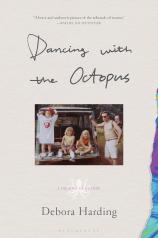Dancing with the Octopus: A Memoir of a Crime
Review
Dancing with the Octopus: A Memoir of a Crime
Innumerable thrillers and crime novels begin with the disappearance of a young girl. Even if the author allows her to survive and return home, the tale often ends with the justice of a closed police or court case. Of course, we know that in real life the ordeal doesn’t actually end, as the crime continues to impact everyone involved. Debora Harding lives that story and has since a freezing day in 1978 when she was abducted from her church parking lot. The subtitle of DANCING WITH THE OCTOPUS is “A Memoir of a Crime,” but readers soon realize that while the crime is the capstone to the book, the delicate archway it sits atop is a dysfunctional family, building a wall out of decades of PTSD.
On a November afternoon at the start of a long weekend, as an ice storm began to settle on Omaha, Harding was a 14-year-old girl walking from school to choir practice at church. It was picture day, and she was dressed in a carefully selected outfit, her hair feathered just so. Charles Goodwin, a teenager in a ski mask with fantasies of ransom money, forced her by knifepoint into the stolen van he was driving. Harding remained remarkably calm as he made her call her father with demands for cash. She talked to him about God as he drove her away from town. After he raped her and left her for dead in the middle of the storm, she found help and gave the police as much information as she could, which helped lead to his eventual conviction.
"It may be odd to say that such a harrowing true story is a page-turner, but it is. Harding’s narrative is strong and compelling, well-paced and brutal. But it is not without optimism, love and, if not forgiveness or understanding, at least a willingness to attend to a variety of perspectives."
Encouraged by her parents, Harding returned to life as normal almost immediately after her kidnapping, going back to school and activities just days later, but still bruised. This hasty return was coupled with her parents’ unhealthy responses to the events. Her abusive mother used it against her, and her beloved father wanted nothing more than to forget it ever happened. Her three sisters were never given the tools to understand what had occurred, and Harding was never treated for her trauma. So that trauma was internalized, creating a further rift between Harding and her mother and continuing to elevate her complicit father as a family hero.
Years go by, and Harding experiences increasing symptoms of PTSD. What she learns is that it was not just what Goodwin did to her that has caused her psychological distress, but also her mother’s abuse, both before and after the abduction, and her father’s willingness to ignore it all. She shares Goodwin’s perspective pieced together from many sources, as well as her own, creating a book that is both a healing and a reckoning.
DANCING WITH THE OCTOPUS is an affecting memoir, to say the least. Harding recounts the horror of her kidnapping and assault, as well as painful episodes from her childhood, with a practiced detachment and still manages an intimate writing style. Her honesty is impressive as she explores her family dynamic, its longstanding effects and how it exacerbated the ordeal she suffered at Goodwin’s hands. The greater terror, threat and betrayal by far is what came from her parents, not the stranger.
It may be odd to say that such a harrowing true story is a page-turner, but it is. Harding’s narrative is strong and compelling, well-paced and brutal. But it is not without optimism, love and, if not forgiveness or understanding, at least a willingness to attend to a variety of perspectives.
This highly recommended work of nonfiction is a gripping account of faith, family, survival and the power of self.
Reviewed by Sarah Rachel Egelman on September 25, 2020
Dancing with the Octopus: A Memoir of a Crime
- Publication Date: October 5, 2021
- Genres: Memoir, Nonfiction
- Paperback: 384 pages
- Publisher: Bloomsbury Publishing
- ISBN-10: 1635577845
- ISBN-13: 9781635577846




